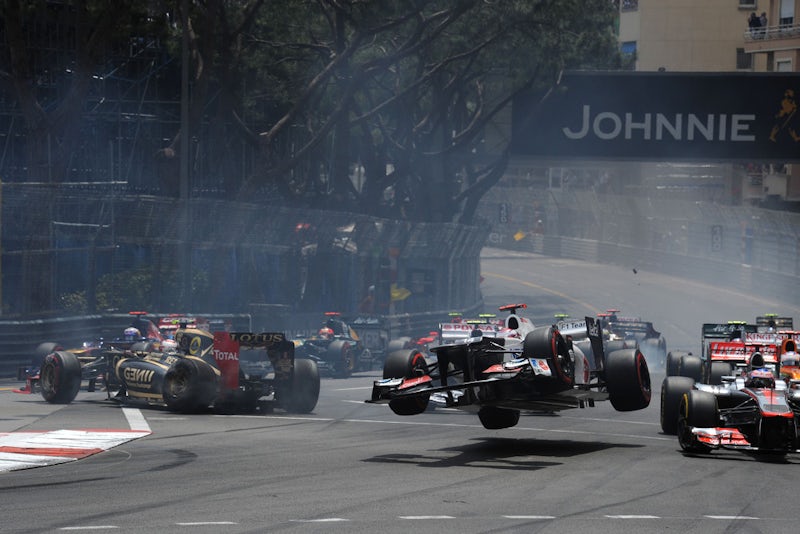ADVERTISEMENT
F1's most dangerous racetracks

Cars collide during the Grand Prix of Monaco F1 race in Monte Carlo, Monaco. (Photo by Bernard Asset/Panoramic/Icon Sportswire)
Formula 1 drivers are fearless, with lightening-quick reaction speeds and an incredible knowledge of how their car is likely to behave and react at any given moment.
An F1 driver’s pulse ranges from 160 beats per minute to 200 beats per minute and will peak at 220 bpm in high-pressure moments. The weight of a driver’s head and helmet increases five times during hard braking, and the driver feels an overload of 5g in downforce.
To put that into perspective, an astronaut during launch would feel 4g.
These drivers are incredible humans, unphased by the risks put in front of them and determined to be the fastest they can be.
With the F1 season heating up, here are the three most dangerous tracks on the race circuit.
Monaco
The Circuit de Monaco is a street circuit that winds around the harbor in Monte Carlo and has been an infamous part of the racing calendar since 1929. Despite being one of the slower tracks for average speed — the Fairmont Hairpin is the slowest corner in F1 taken, at just 48km/h — it is one of the most demanding and dangerous.
The tight and twisty nature of the circuit demands respect, and the barriers are only ever a whisker away from the cars.
Martin Brundle famously put his car upside down in 1984 and admitted not remembering how he got back to the garage, while Irishman Derek Daly sent his car flying at the first bend in 1980.
More recently, both Jenson Button and Sergio Perez suffered huge incidents flying out of the famous Monaco tunnel at 260km/h.
On This Day In 1980:
— For Race Fans Only (@ForRaceFansOnly) May 19, 2020
Derek Daly's first lap crash at the Monaco Grand Prix#F1 pic.twitter.com/Ugiu7RLcCc
Sadly, Monaco also claimed the life of Lorenzo Bandini when he raced for Ferrari in the 1967 Grand Prix. Bandini clipped a chicane and collided with a mooring head, which flipped the car as it exploded into flames.
Monza
The Italian Grand Prix has been staged at Monza every year except one since its inception. The famous track was the world’s third purpose-built racing circuit almost 100 years ago and has spent a century building up a reputation for being one of the most dangerous.
In total, there have been three fatal incidents at the track in F1. Swedish driver Ronnie Peterson died after a crash at the start of the race in 1978. In 1970, Austrian Jochen Rindt was killed after crashing at the Parabolica — a corner that drivers now approach at 335km/h in seventh gear.
It was at the Curva Parabolica in 1961 where F1 had one of its most tragic incidents. Wolfgang von Trips collided with Jim Clark, which sent von Trips’ car into the sky and into the barriers. Von Trip and 15 spectators were killed.
Thank heavens Charles Leclerc survived that crash at Monza. Straight into a safety wall. Vettel earlier a DNF for the @ScuderiaFerrari with brake failure. Horrible, horrible season is right. #ferrari #f1 #MonzaGP #ItalianGP #leclerc #charlesleclerc pic.twitter.com/VhUVHPG76S
— Robert Grasso (@RobertGrasso) September 6, 2020
The Parabolica continues to be a dangerous corner even today. In the 2020 running of the race, Ferrari’s Charles Leclerc lost control and collided with the barrier, causing a red flag.
Nürburgring
The German Grand Prix returns to the Nürburgring for the first time in seven years this October. While the new circuit is considered by loyal fans to only be a shadow of its former self, we cannot compile a list like this without mentioning the track and legendary driver Niki Lauda.
Between 1954 and 1969, the German Grand Prix claimed the lives of five drivers. Jackie Stewart dubbed the racetrack "The Green Hell" due to its lightening-fast speeds and dangerous corners.
Changes were made after pressure from drivers in 1971. The bumps were smoothed out, the track was made straighter and safer barriers were installed.
Then came Niki Lauda's accident. On lap 2 of the 1976 Grand Prix, Lauda lost control, hit the barrier, and was engulfed in flames, before being hit by another car.
Lauda was trapped for more than a minute as fellow drivers attempted to save him. The Austrian ended up in a coma and was given last rites in the hospital.
The video of Niki Lauda’s crash is one of the scariest F1 incidents ever caught on camera. The fact that he survived this fiery crash at Nürburgring and went on to live another 43 years is remarkable. May he RIP pic.twitter.com/NHxuGbhiIB
— Igor Mello (@SuperIgor) May 21, 2019
Incredibly, just six weeks later, Lauda was back to race in Monza in the Italian Grand Prix, with bloody bandages across his head to protect the burns.
He went on to finish fourth. The next season he won the German Grand Prix at Nürburgring and won the Driver’s Championship for the second time.
ADVERTISEMENT